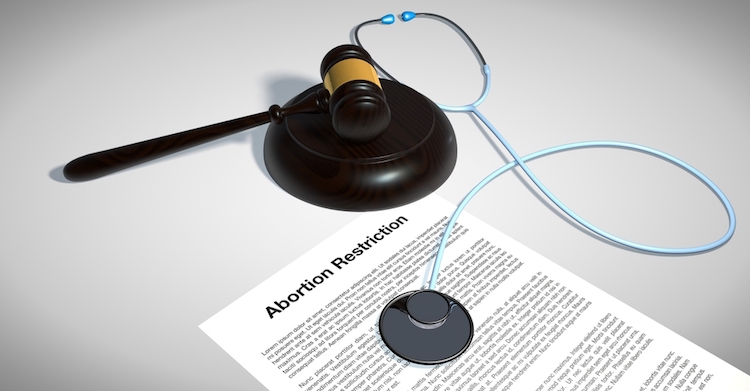ABA urges Supreme Court to rule US can sue to block unconstitutional Texas abortion law

Image from Shutterstock.
Texas “undercut the rule of law” when it passed an unconstitutional abortion law intended to evade court review, the ABA said in an amicus brief filed with the U.S. Supreme Court on Wednesday.
The ABA amicus brief urges the Supreme Court to allow the federal government to sue to block the law, which bans abortions after about six weeks of pregnancy. An ABA press release has details.
The law relies on the general public, rather than the state, for enforcement. It authorizes lawsuits by private parties who may seek $10,000 in damages against anyone who aids an abortion.
“Consistent with its mission and its policy, the ABA files this brief to support the federal government’s ability to hold Texas accountable for its unconstitutional acts and to ensure continuing access to the courts to protect fundamental constitutional rights,” the ABA brief said.
The Supreme Court agreed last week to consider whether the federal government and abortion providers can sue to block the law. The court left the law in place but expedited the two challenges and set oral arguments for Nov. 1.
The ABA brief was submitted in the federal government’s case, United States v. Texas.
Texas has argued that neither the federal government nor abortion providers can sue to block the law in federal court because it is enforced exclusively through private civil suits, rather than by the state.
“Texas’ actions are particularly troubling,” the ABA brief said, because “it has sought to ensconce beyond the reach of federal review a law that unquestionably contradicts this court’s holdings that the Constitution protects the right to abortion until the point of fetal viability.”
The ABA brief said Texas can’t avoid liability for its role in making the coercive power of the government available to private citizens through lawsuits enforced in the courts.
In support of its argument, the brief cited the 1948 Supreme Court case Shelley v. Kramer. The decision said court enforcement of race-based restrictive covenants between individuals amounted to state action that violates the equal protection clause of the 14th Amendment.
“If a state could disclaim constitutional responsibility for private lawsuits that it authorizes and enforces through its courts, no constitutional right would be safe,” the ABA brief said.
One example cited by the ABA: If Texas can authorize enforcement of its law through private lawsuits, another state could make handgun ownership illegal and allow enforcement through private lawsuits.
“In Texas’ view, so long as a state did nothing more than allow and enforce such suits, no federal court, including this one, could do anything about it,” the ABA brief said. “This court has never countenanced such lawlessness.”
ABA President Reginald Turner is listed as counsel of record on the brief. No law firm is named on the brief because none assisted in its preparation, according to Jacqueline Salmon, the ABA’s principal media strategist.
See also:
ABAJournal.com: “Convicted ex-lawyer files bizarre suit against doctor under Texas abortion law”
ABAJournal.com: “DOJ explores ways to challenge Texas abortion law; judge grants TRO against anti-abortion group”
ABAJournal.com: “How could the DOJ counter Texas abortion restrictions? Law prof suggests prosecution”
ABAJournal.com: “SCOTUS formally rejects request to block Texas abortion ban”
ABAJournal.com: “Abortion providers ask Supreme Court to block Texas heartbeat law from taking effect”
ABAJournal.com: “Conservative SCOTUS justices question abortion decisions but delay action on Mississippi’s viability cert petition”
ABAJournal.com: “Supreme Court should uphold precedent in Mississippi abortion case, ABA amicus brief says”
ABAJournal.com: “SCOTUS considers expediting request to hear Texas abortion case, orders quick responses”
Write a letter to the editor, share a story tip or update, or report an error.


